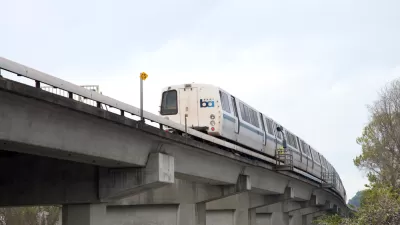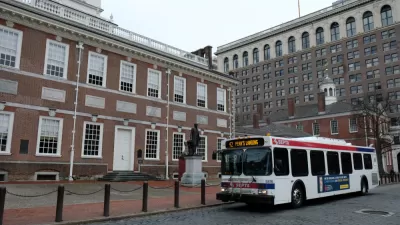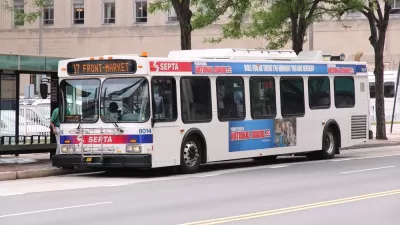Transit ridership is spiking across the country as gas prices go up. Is this a tipping point for America's car culture?
"Across the nation, the price of gasoline is sending more and more Americans to public transit.
This ridership surge points up three things: (1) These millions of new riders can do it. Most of them always could have. They just didn't. (2): We're not at the end of car culture yet . . . that's a few generations off . . . but (3) it's clear, in not-quite-hindsight, that the U.S. car culture does not work.
Car culture got us where we wanted when we wanted - for five generations. Much has been spectacular, beyond what could have been dreamed 100 years ago.
How, then, can I say that car culture doesn't work? Because the cost to individual and communal life, and to the environment, has been too high. And the bill is just now coming due.
It's not evil, just heedless. People take the opportunities they're given. They have the right. The car symbolizes freedom, rights of passage, career, sexuality. We've created the national road system, bought hundreds of millions of cars, based hundreds of millions of lives on the assumption that Hey, we can just drive.
We've basically laid the environment to waste, millions of acres never to return, all because there was no plan B. Roads are good things - but where you build a road, you outrage an environment, and no one ever rectifies it. The sad sprawl of the 1980s and 1990s, when people let towns metastasize into hastily planned and built exurban strips - that worked well, didn't it?
Many are now finding there are other ways. As oil gets scarcer and pricier, people may start to work closer to home, based on resources. They're starting to, it seems. That may benefit cities, with people increasingly opting for "elegant density" and closeness to work and amenities. We should have been doing this all along. We just weren't paying attention.
So, no, we haven't reached the tipping point - we've reached a pocketbook point. When things really tip, we'll discover - gasp - we don't have enough trains and buses for those who need them."
FULL STORY: The American car culture is running out of gas

Maui's Vacation Rental Debate Turns Ugly
Verbal attacks, misinformation campaigns and fistfights plague a high-stakes debate to convert thousands of vacation rentals into long-term housing.

Planetizen Federal Action Tracker
A weekly monitor of how Trump’s orders and actions are impacting planners and planning in America.

San Francisco Suspends Traffic Calming Amidst Record Deaths
Citing “a challenging fiscal landscape,” the city will cease the program on the heels of 42 traffic deaths, including 24 pedestrians.

Defunct Pittsburgh Power Plant to Become Residential Tower
A decommissioned steam heat plant will be redeveloped into almost 100 affordable housing units.

Trump Prompts Restructuring of Transportation Research Board in “Unprecedented Overreach”
The TRB has eliminated more than half of its committees including those focused on climate, equity, and cities.

Amtrak Rolls Out New Orleans to Alabama “Mardi Gras” Train
The new service will operate morning and evening departures between Mobile and New Orleans.
Urban Design for Planners 1: Software Tools
This six-course series explores essential urban design concepts using open source software and equips planners with the tools they need to participate fully in the urban design process.
Planning for Universal Design
Learn the tools for implementing Universal Design in planning regulations.
Heyer Gruel & Associates PA
JM Goldson LLC
Custer County Colorado
City of Camden Redevelopment Agency
City of Astoria
Transportation Research & Education Center (TREC) at Portland State University
Jefferson Parish Government
Camden Redevelopment Agency
City of Claremont





























